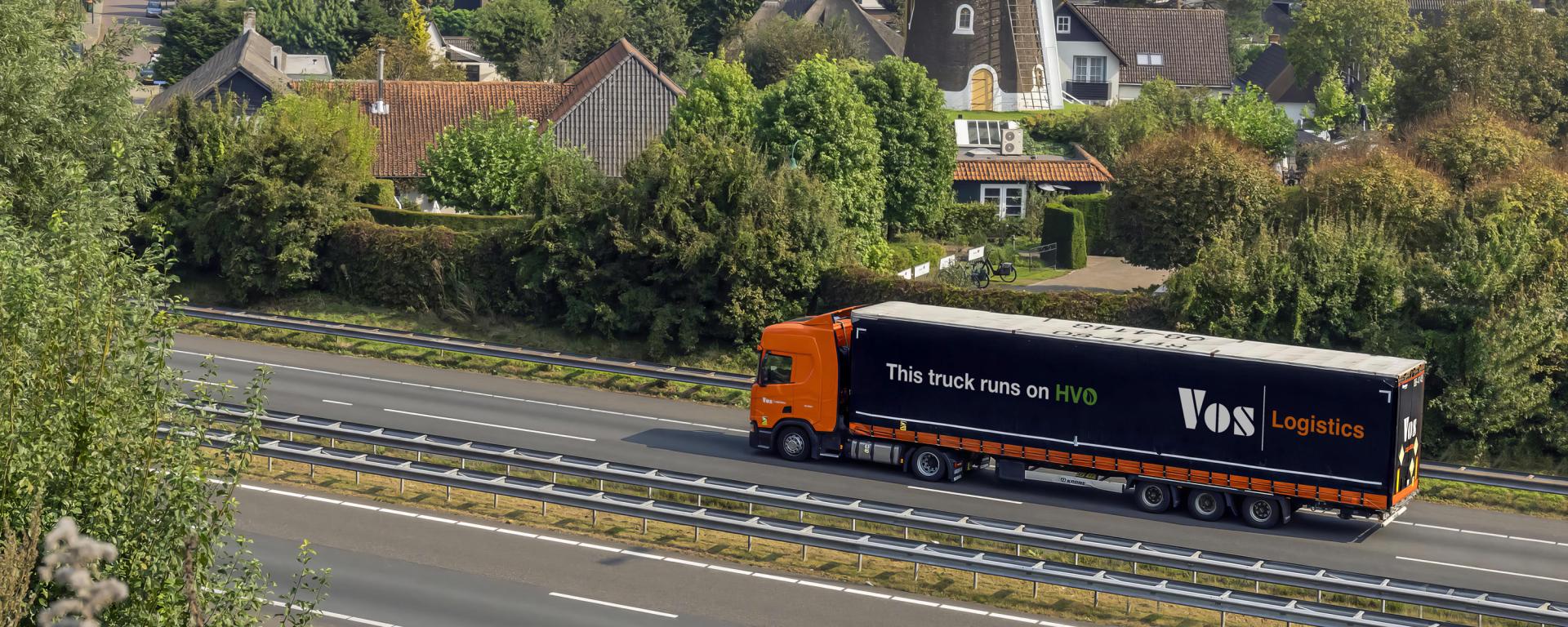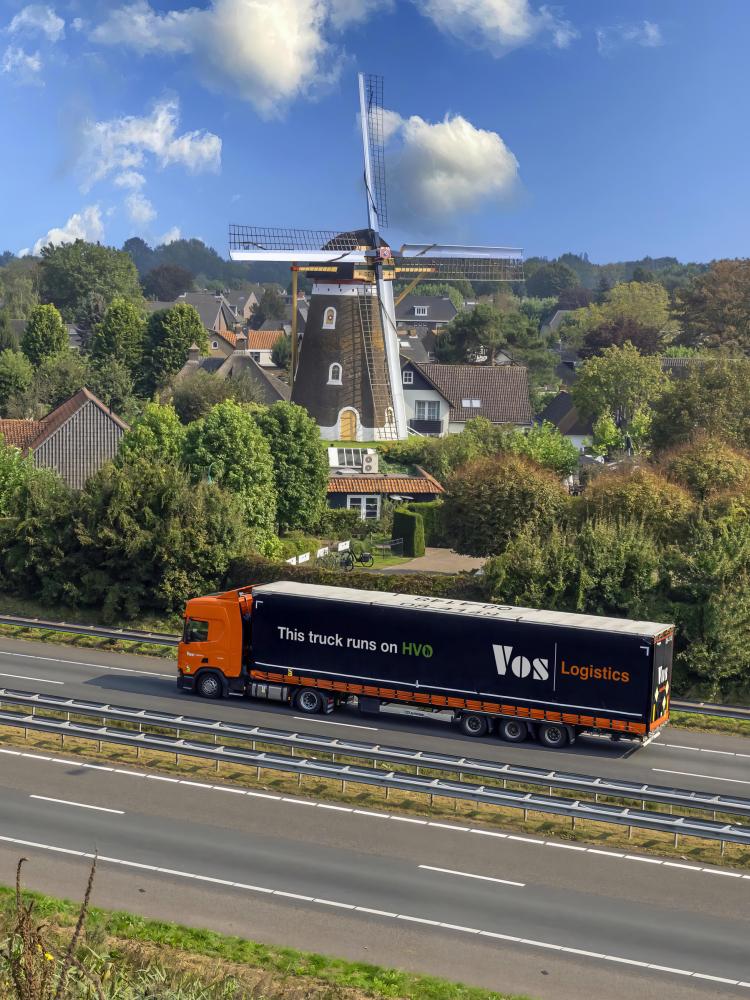


A challenge?
Get in touch.
Helping customers hit sustainability targets with HVO100
Vos Logistics is working towards making transport more sustainable. One way is by offering the use of Hydrotreated Vegetable Oil (HVO100), a renewable diesel alternative.
HVO insetting is an environmentally conscious approach that involves using Hydrotreated Vegetable Oil (HVO)—a renewable diesel derived from waste fats and oils—to reduce CO₂ emissions directly within a company’s logistics operations. Unlike offsetting, which mitigates emissions through external actions like tree planting, insetting achieves reductions at the source by substituting fossil diesel with HVO in actual transport routes. Through offering this insetting model, we help participating customers to reach emissions goals, while receiving the most efficient and reliable logistics services.
Empowering customers
“Our clients have ambitious sustainability targets, and we’re here to help them achieve those goals,” explains CFO, Ben Vos. “By offering HVO100 as an option, we’re providing our customers with a tangible and immediate way to lower their carbon emissions.”
In addition to offering HVO100, Vos Logistics also helps customers reach their sustainability targets by:
Providing transparent CO2 emission data on invoices for every shipment, giving customers insight into their environmental impact. The company can also adjust fuel types, such as switching to HVO for lower emissions, and customize fuel consumption values based on specific needs.
Providing custom CO2 reports tailored to shipment details, including kilometres, weight, or pallets, using advanced BI tools. All calculations follow the GHG Protocol and use verified data from co2emissiefactoren.nl. GHG Protocol stands for Greenhouse Gas Protocol and provides the world's most widely used greenhouse gas accounting standards for companies. Greenhouse Gas Protocol provides standards and tools that help countries and cities track progress toward climate goals. In 2023, 97% of disclosing S&P 500 companies reported to CDP using GHG Protocol.
The results are in
Vos Logistics has already helped clients achieve measurable results. One notable collaboration reduced emissions by 60% on specific routes, illustrating the potential of HVO100 to transform logistics operations sustainably.
For example PRS Pooling, which is part of the Faber Group, a family owned company with a history dating back to 1891. Faber Group is one of Europe’s leading companies providing sustainable pallet pooling services and is also a producer of sustainable wooden products. Vos Logistics provides transport services exclusively on HVO100 for PRS Pooling.
Marty Smits, Transport Coordinator at PRS Pooling confirms: “In our search for possibilities towards a more sustainable future, Vos Logistics allows us to make good progress in attaining our sustainability goals by having our shipments carried out with HVO100 bio diesel.”
Overcoming Challenges
Transitioning to HVO100 doesn't come without its challenges. Securing a consistent supply of high-quality renewable fuel and optimizing operations to support its use required strategic planning and commitment. But for Vos Logistics, the benefits far outweigh the hurdles.
“Every step we take toward sustainability strengthens our relationships with customers and strengthens our reputation as a solutions-focused, forward-thinking logistics provider,” Ben Vos, CFO at Vos Logistics explains.
A Greener Future Ahead
Vos Logistics plans to continue to scale up the use of HVO100 on more routes and for more customers. The company is also looking at other sustainable options like electric and hydrogen vehicles, but these take time to scale. HVO100 remains a leading intermediate solution for large-scale transport today.
What is HVO100?
HVO100 is made from sustainable raw materials such as vegetable oils and animal fats. Unlike traditional fossil diesel, it can reduce carbon dioxide (CO₂) emissions by up to 90%. Its compatibility with existing diesel engines makes HVO100 a practical solution for businesses seeking immediate impact without extensive equipment overhauls.
Why is HVO100 Important?
Vos Logistics has clear goals to reduce emissions and become more sustainable. While fully electric vehicles are the long-term aim, HVO100 is an excellent more immediate step.
A Clear Look at the Benefits and Challenges of Using HVO100
Benefits
- Lower Emissions: HVO100 helps Vos Logistics reduce CO₂ emissions right away.
- Support for Customers: We help our customers reach their sustainability goals. We also provide them with clear CO₂ data.
- Clear Tracking: Vos Logistics has systems to make sure HVO100 usage is tracked and correctly reported for each customer.
Challenges
- Recognition Problems: HVO100 is not officially accepted in some zero-emission zones in the Netherlands. In Germany, HVO100 does not qualify for toll rebates that electric vehicles get.
- Higher Costs: HVO100 is more expensive than regular diesel.
- Policy Issues: Some policymakers focus only on zero tailpipe emissions, ignoring the overall reduction in CO₂ that HVO100 provides.
More information?
If you are interested to learn more about this topic, please contact Paul Kooijman through pkooijman@voslogistics.com or +31(0)6 220 905 17.

A challenge?
Get in touch.
 Contact
Contact